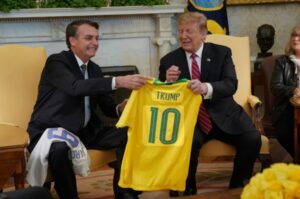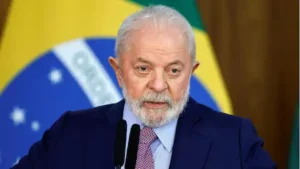Brazil’s Lula Slams Trump on Terrifs
“Won’t Take Orders from a Gringo”: Brazil Pushes Back Against Trump’s Tariff Threats.
In a sharp rebuke with global implications, Brazilian President Luiz Inácio Lula da Silva has drawn a red line: Brazil will not bow to what it sees as bullying from former U.S. President Donald Trump.
The catalyst? A sudden 50% tariff hike on Brazilian exports to the United States, effective August 1.
What began as a policy dispute is now snowballing into a symbolic face-off over sovereignty, trade justice, and the balance of power in a shifting global order.
Tariffs, Tweets, and Tensions: How the Clash Began
Trump’s decision to impose tariffs on Brazilian goods, officially framed as a response to “unfair trade practices” and anti-U.S. bias, is widely seen as politically motivated.
Trump blames the Lula administration for what he calls the “unjust persecution” of Brazil’s former president Jair Bolsonaro—his ideological ally and friend.
Bolsonaro is currently on trial for allegedly leading a failed coup attempt in early 2023. Lula’s administration has stood firm on the rule of law, while Trump has rallied to Bolsonaro’s defense, calling him a “hero” and a “victim.”
The tariff move came shortly after Trump published an open letter criticizing Brazil’s handling of Bolsonaro and warning of “consequences.”

Lula Responds: “We Don’t Want an Emperor”
President Lula has responded with characteristic bluntness. Speaking to student activists in Goiás this week, he called Trump an “emperor the world doesn’t want” and refused to take “orders from a gringo.”
In Brazilian Portuguese, gringo simply means foreigner, but Lula’s usage carried unmistakable political weight.
Brazil’s President Lula said,
- “Our countries are sovereign”
- “If Trump imposes tariffs, we have the right to respond. A gringo will not give orders to the president of the republic.”
The comment made global headlines and set the tone for a deeper diplomatic rupture.
In a televised address, Lula went further, accusing the United States of “unacceptable blackmail” and spreading “false information about trade.”
Not Just About Bolsonaro: The Bigger Stakes
While the Bolsonaro saga may have sparked the crisis, the rift goes much deeper.
Lula’s government has moved aggressively to rein in U.S. tech giants like Google, Meta, and Amazon—accusing them of allowing fake news to spread and undermining democracy in Brazil.
This push to regulate digital platforms is being framed by Trump and his supporters as censorship, even as the U.S. launched an investigation this week into Brazil’s tech regulation, citing “unfair trade practices.”
Lula, however, is standing firm:
- “The defense of sovereignty also applies to foreign digital platforms. All national and foreign companies operating in Brazil must comply with our laws.”
Trade Irony: U.S. Has Surplus, Not Deficit
Despite Trump’s tariff claims, the U.S. actually benefits from its trade relationship with Brazil.
In 2024, the U.S. exported more to Brazil than it imported. Top exports include aircraft, industrial machinery, and electrical equipment.
A retaliatory strike from Brazil could hurt these sectors—especially Boeing, which sees Brazil as a vital market.
Lula’s team is already preparing a proportional response.
Foreign Minister Mauro Vieira has confirmed that Brazil is consulting industry leaders on countermeasures, also said that,
- “Brazil will not accept anything imposed on it. We accept negotiation, not imposition.”
Lula’s Political Win: Approval Ratings Rise
Ironically, Trump’s pressure may have given Lula a domestic political boost. His approval ratings have jumped from 40% in May to 43% in July, according to a recent Datafolha poll.
His firm stance is resonating with Brazilians tired of external interference.
Moreover, Lula emphasized that Brazil was open to dialogue: “We proposed negotiations to the U.S. government on May 16. What we received was blackmail and threats.”

The BRICS Factor: A Multipolar World Order
Trump’s hostility toward Brazil may also be rooted in geopolitics. Lula has reaffirmed Brazil’s commitment to BRICS—a group Trump views with suspicion.
With new members joining and the bloc moving to trade in local currencies, BRICS is increasingly seen as a challenge to U.S. dominance.
Trump has openly accused the group of pushing “anti-Western priorities” and warned members like Brazil to “pick a side.”
Lula has resisted this binary, positioning Brazil as a sovereign nation pursuing multipolar cooperation.
What Comes Next: Economic War or Truce?
The situation now stands at a crossroads. On one side is Trump, who remains the Republican frontrunner for the 2024 U.S. presidential election and continues to influence global politics with aggressive rhetoric.
On the other side is Lula, representing a global south tired of unilateral pressure from Washington.
Both leaders are playing to domestic audiences, but the fallout could ripple globally.
Retaliatory tariffs from Brazil may hit key U.S. exports. Tech regulation disputes could escalate into broader trade blockades.
And diplomatically, the fracture risks weakening multilateral efforts on climate, health, and global development.
More Than Just Tariffs
This is more than a bilateral trade spat. It’s a symbolic fight over sovereignty, diplomacy, and the future of global leadership.
Lula is drawing a line—not just for Brazil, but for a larger global south increasingly unwilling to be sidelined.
Whether Trump’s tariff threats escalate into a full-blown trade war or fizzle out in negotiations remains uncertain.
But one thing is clear: Lula won’t be taking orders from a gringo.
